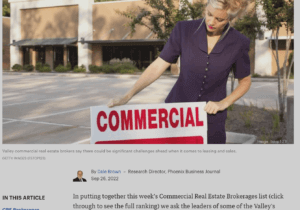By Beth Jo Zeitzer for Arizona Attorney
Knowing the toll the coronavirus is taking on the nation’s health and financial well-being, it can be a tough time to be optimistic and make big decisions. Still, from a commercial real estate perspective, the market downturn presents ample opportunities for attorneys and their clients. Whether you are interested in renewing or renegotiating a lease, moving into a new or different office space, or acquiring properties for occupancy and/or investment, the change in the market may provide options that would not have been available just a few short months ago.
Before getting into the specifics of those types of transactions, we must look at the big picture of the commercial real estate industry. While the impact of the COVID-19 pandemic has been sharp and dramatic for financial markets and residential real estate, commercial real estate tends to move more slowly during times of disruption. Nonetheless, the initial period of sheltering-in-place, nonessential business shutdowns, and other factors soon saw deals cancel due to concerns regarding the economy, and it is now more difficult to get deals financed. The commercial deals that seem to be “sticking” are owner–occupant office and industrial product. Many investor deals seem to be frozen, with investors anxiously waiting to see how all of this shakes out, and downward pressure in almost every asset class.
While we want to be optimistic, we also need to be realistic about when and how quickly things will recover. In early April, Arizona Gov. Doug Ducey signed Executive Order 2020-21, which stopped evictions and lockouts of small business tenants (500 or fewer employees) until May 31. Tenants are still obligated to pay the rent that was owed, however; failure to do so would put them in default and at risk of the customary eviction or lockout proceedings once the order expires. In addition, nonpayment may be problematic for tenants with other rights, duties and obligations in their leases. For instance, a default may preclude a tenant from exercising a future option to extend. With the deferral of rent payments and stalling of foreclosures, it will likely be next month or even later this summer before the full state of the market is clear.
The long-held view of commercial real estate is that it is not as volatile as the stock market. In addition, the lower cost of capital offers an opportunity to significantly increase returns. Historically, periods of recession and stock market turmoil also have led investors into hard assets for predictable returns. That positive view, however, needs to be balanced with the price drops in assets and erosion of equity that we have already seen. No one wants to be the one catching the falling knife!
Perspective on Purchasing
With that caveat in mind, the instability in the market will provide purchasing opportunities through pricing adjustments. In addition, the availability of affordable financing may make it significantly easier to buy commercial property.
The financing of transactions may be moving into a challenging period, as lenders assess what is in their pipeline, how to value properties in a declining market and what protections to put in place to ensure performance. Marginal borrowers will face some serious headwinds. And equity requirements are already increasing, along with additional assurances, including heavy interest and expense reserves.
On a more positive note, businesses in our region are available to qualify for interim financing at extremely low interest rates through the U.S. Small Business Administration. We already have found the SBA to be a lifeline for many of our clients, with programs such as the Payroll Protection Program and Economic Injury Disaster Loan.
So why are we seeing so many properties hitting the market? Several factors are immediately in play—and demand caution on the part of any would-be buyer. While they are down from their peak, comparable sales over the past year are still on the higher end, due to steady increases over the past several years. Buyers are going to buy, and lenders are going to underwrite, for the most part, on that historical basis.
Meanwhile, cap rates are still on the low end of the historical band. The higher pricing over the past several years translates to low cap rates, which are an indicator of lower risk. We anticipate that cap rates will steadily rise, and pricing will decrease, accordingly, in the near term.
Where will the best opportunities lie? While there is no guarantee, we anticipate softness in the multifamily, retail, hotel and office asset classes. For office properties, many companies will look at their budgets and reassess their policies on employees working from home, based on their experiences from this spring. Owner–occupant property pricing is likely to come down a little bit, but it is unlikely to take as deep of a dive as investor properties. As you might guess, the multifamily and retail/hotel markets will emerge from the coronavirus epidemic with their share of scars and a heady amount of risk. Prospects for net-lease properties will be dependent on the financial stability of the tenant. Overall, we would anticipate cap rate increases and downward pressure on pricing.
In contrast to harder-hit segments, investors may consider opportunities in industrial/warehouse properties, which seem to have fared well with many of us ordering goods online instead of shopping.
If you or a client are in the market to purchase commercial property, recognize that the due diligence aspect of deal-making has never been more essential—and commercial real estate owners are a sophisticated group of negotiators. First and foremost, in a fast-changing environment, you should be examining actual financials rather than pro formas. While the physical pieces of a transaction will be business as usual, for those who are looking at properties with tenants, realize that the underwriting requirements of individual tenants will be tightened up, based on their long-term viability. And for those who are 1031 exchange purchasers or involved in opportunity zone investments, the IRS granted an extension that is coming up shortly: July 15.
The Low-Down on Leasing
On the leasing side, in addition to lower rental rates occurring in the market, current owners will be much more willing to negotiate on terms. With COVID-19 hitting everyone’s bottom line, tenants are seeking ways to decrease their expenses, across most asset classes. They have significant leverage, as landlords look at their vacancies and diminished rent rolls and do everything in their power to retain viable long-term tenants.
As a commercial tenant, it can be tempting to overplay that leverage, but a wiser course is that you do not want to burn any bridges, and you should make good on your responsibilities if you have the ability. Landlords have long memories and longterm perspectives.
The best plan is to consider the relationship aspect, and to negotiate in good faith with your landlord if you are seeking rent concessions. Some of the options available to you include lease deferrals (tacking delinquent rent onto the back end of the lease); temporary lease waivers; rent reductions for a given period of time or the remainder of your lease; or even extending your lease at a lower rate upon expiration.
The main priority is to sit down and proactively problem-solve, openly and honestly. Recognize that your landlord may be going through difficult times as well.
Beyond traditional leasing deals, there are other options emerging in the wake of the crisis. We are already seeing an uptrend in subleases, as office-based businesses scale back on headcount and consolidate resources. Along the same lines, there are a plethora of cohabitation/office-sharing opportunities starting to hit the market, with more anticipated.
Creating Your Plan
The commercial real estate market is in considerable flux right now. Creating a strategic plan is going to be the smart route for attorneys and their clients who want to achieve the best business terms.
As with all property transactions, there is no perfect time to buy, sell or negotiate the terms on a commercial property—nor is there any single metric that can determine when it is right to make a move. While a rising market can make anyone look like a genius, a falling market brings to mind the famous Warren Buffett saying, “You only find out who is swimming naked when the tide goes out.”
Having a strategic plan in place—and enlisting the assistance of an expert in commercial real estate—can help guide your decision making in any type of market, and that is particularly true during tumultuous times like these. For all of the challenges, a disrupted market offers a unique opportunity to niche down and find the phenomenal opportunities that are available.











